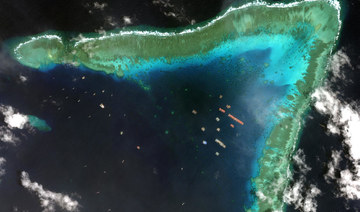MANILA: Nearly 1,700 Filipino and American military personnel will take part in a two-week joint exercise from Monday.
The exercises are taking place amid rising tensions over Beijing’s increasingly aggressive behavior in the South China Sea and a dramatic surge in COVID-19 cases across the Philippines.
Unlike in previous years, the Balikatan exercises 2021 (BK-21) will not be open to the public as part of safety protocols to limit the coronavirus outbreak’s spread.
“The exercises officially start tomorrow and will last for about two weeks,” Armed Forces of the Philippines (AFP) Chief of Staff Lt. Gen. Cirilito Sobejana told reporters on Sunday.
“We will be conducting (the exercises), but it will be different from previous years because of the pandemic. There will be a virtual (portion) of the exercise,” he said.
The opening ceremonies for BK-21 will be held at the AFP General Headquarters in Camp Aguinaldo, Quezon City on Monday, Sobejana said, adding that 700 American and 1,000 Filipino troops would take part.
This year’s resumption of the annual BK-21 event, which was called off last year due to the pandemic, follows a phone call between the two countries’ defense chiefs on Sunday to “reaffirm their shared commitment to the US-Philippines alliance.”
In a statement, Pentagon spokesperson, John Kirby, said that US Secretary of Defense Lloyd Austin III and his Filipino counterpart, Delfin Lorenzana, “discussed the situation in the South China Sea, and the recent massing of People’s Republic of China maritime militia vessels at Juan Felipe (Whitsun) Reef.”
The boomerang-shaped Julian Felipe Reef is about 175 nautical miles west of Bataraza, Palawan, within the Philippine Exclusive Economic Zone (EEZ) and Continental Shelf (CS).
Austin proposed several measures to “deepen defense cooperation between the United States and the Philippines, including by enhancing situational awareness of threats in the South China Sea,” according to Kirby.
He also “reiterated the US commitment to maintaining a free and open Indo-Pacific, rooted in international law, including the UN Convention on the Law of the Sea (UNCLOS).”
The two leaders also affirmed the value of the US-Philippines Visiting Forces Agreement (VFA), with Department of National Defense (DND) spokesperson, Arsenio Andolong, saying that the US official “reiterated the importance of the VFA and hopes that it would be continued.”
“Secretary Lorenzana committed to discussing the matter with the president as the final approval lies with him,” Andolong said.
In February last year, Philippine President Rodrigo Duterte unilaterally terminated the VFA after Washington canceled the visa of one of his close political allies and former police chief, Sen. Ronald Dela Rosa.
He extended the withdrawal period twice “to allow both sides to find a more enhanced, mutually beneficial, mutually agreeable . . . and lasting arrangement.”
In December, however, he demanded that the US pay for the VFA.
The VFA provides a legal framework within which US troops can operate on a rotational basis in the Philippines.
Besides the VFA, Andolong confirmed that the two defense chiefs also “discussed the situation in the West Philippine Sea and recent developments in regional security.”
He said that the Balikatan exercises “would be a very scaled-down version” of the annual event.
“It will be just tabletop exercises, just a handful of people doing planning and simulation. There will be no amphibious exercises, and we won’t be seeing various (US military) assets rolling and flying here and there,” he told Arab News on Sunday.
“American forces participating in the activities will be subject to COVID-19 health protocols and guidelines that are used for all foreigners coming into the country. No exemption,” he added.
When asked about the significance of the exercises this year, Andolong said: “It’s really important because . . . in light of recent developments in the West Philippine Sea, I think it’s an affirmation that our (US-Philippines) alliance with our only defense treaty ally is still alive and well.”
“I think that’s important especially now that there are doubts not only due to (current) defense (issues), the pandemic, and all other reasons,” he said.
The Balikatan is an annual US-Philippine military training event focused on various missions, including humanitarian assistance and disaster relief, counter-terrorism, and other combined military operations.
Philippine and US service members will conduct humanitarian civic action (HCA) activities throughout Luzon during BK-2021. The exercise will also demonstrate cooperation and interoperability between the Philippines and the US, consistent with the Mutual Defense Treaty and the VFA.













